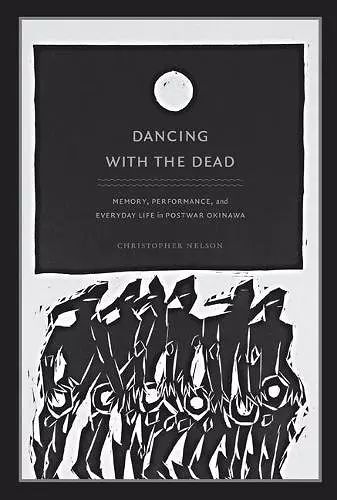Dancing with the Dead
Memory, Performance, and Everyday Life in Postwar Okinawa
Format:Paperback
Publisher:Duke University Press
Published:12th Dec '08
Currently unavailable, and unfortunately no date known when it will be back

Ethnography that explores wartime trauma, memory, and social life in post-war Okinawa
Examines how Okinawans have contested, appropriated, and transformed the burdens and possibilities of the past. This title analyzes the practices of specific performers, showing how memories are recalled, bodies remade, and actions rethought as Okinawans work through the fragments of the past in order to reconstruct the fabric of everyday life.Challenging conventional understandings of time and memory, Christopher T. Nelson examines how contemporary Okinawans have contested, appropriated, and transformed the burdens and possibilities of the past. Nelson explores the work of a circle of Okinawan storytellers, ethnographers, musicians, and dancers deeply engaged with the legacies of a brutal Japanese colonial era, the almost unimaginable devastation of the Pacific War, and a long American military occupation that still casts its shadow over the islands. The ethnographic research that Nelson conducted in Okinawa in the late 1990s—and his broader effort to understand Okinawans’ critical and creative struggles—was inspired by his first visit to the islands in 1985 as a lieutenant in the U.S. Marine Corps.
Nelson analyzes the practices of specific performers, showing how memories are recalled, bodies remade, and actions rethought as Okinawans work through fragments of the past in order to reconstruct the fabric of everyday life. Artists such as the popular Okinawan actor and storyteller Fujiki Hayato weave together genres including Japanese stand-up comedy, Okinawan celebratory rituals, and ethnographic studies of war memory, encouraging their audiences to imagine other ways to live in the modern world. Nelson looks at the efforts of performers and activists to wrest the Okinawan past from romantic representations of idyllic rural life in the Japanese media and reactionary appropriations of traditional values by conservative politicians. In his consideration of eisā, the traditional dance for the dead, Nelson finds a practice that reaches beyond the expected boundaries of mourning and commemoration, as the living and the dead come together to create a moment in which a new world might be built from the ruins of the old.
“Moving from public meetings concerning US bases in Okinawa to the poetry of Takara Ben to amateur dance clubs, this study reveals a complex, comprehensive understanding of Okinawan identity and history. One of the highlights of the volume is Nelson’s recounting of his own experiences as a member of an amateur eisa collective. Although rooted in anthropology, this volume will also be of interest to those in performance studies, Asian studies, history, and cultural studies.” - K. J. Wetmore Jr., Choice
”This book greatly enriches memory studies by unsettling the location of memory. Nelson’s honest voice as an ethnographer also opens up the welcome subject of the ethics of anthropological research through his poetic and moving engagement with the subject. Dancing with the Dead is an absorbing and nuanced ethnography that will be of significant interest to Japan and East Asian specialists and to all who engage with questions of history and memory, subaltern studies, and the ethnography of the everyday.” - Yukiko Koga, American Anthropologist
“Dancing with the Dead is a beautifully written, deeply evocative, and smartly argued book about the ways in which the past intrudes into the present and how memory is given shape, recognition, and vigor through storytelling of various forms. This will be an important book not only for and about Okinawan history but also about the times of continued violence and militarism in which we live.”—Anne Allison, author of Millennial Monsters: Japanese Toys and the Global Imagination
“Colonized by Japan, traumatized by war, dominated by an ongoing American military presence, Okinawa has never attracted the sustained attention of Western anthropologists. That has now changed, for here we have an ethnography of Okinawa that finally does justice to the complexity of its poetic and political realities. In Dancing with the Dead, Christopher T. Nelson takes up the Okinawan performers, raconteurs, and citizens who work to transform everyday life and to reanimate the present, all in the service of cultural and political commemoration. Beautifully written and deeply considered, Dancing with the Dead is a signal contribution to the anthropologies of performance and everyday life, and it will remain the benchmark ethnography of Okinawa for years to come.”—Marilyn Ivy, author of Discourses of the Vanishing: Modernity, Phantasm, Japan
“Moving from public meetings concerning US bases in Okinawa to the poetry of Takara Ben to amateur dance clubs, this study reveals a complex, comprehensive understanding of Okinawan identity and history. One of the highlights of the volume is Nelson’s recounting of his own experiences as a member of an amateur eisa collective. Although rooted in anthropology, this volume will also be of interest to those in performance studies, Asian studies, history, and cultural studies.” -- K. J. Wetmore Jr. * Choice *
”This book greatly enriches memory studies by unsettling the location of memory. Nelson’s honest voice as an ethnographer also opens up the welcome subject of the ethics of anthropological research through his poetic and moving engagement with the subject. Dancing with the Dead is an absorbing and nuanced ethnography that will be of significant interest to Japan and East Asian specialists and to all who engage with questions of history and memory, subaltern studies, and the ethnography of the everyday.” -- Yukiko Koga * American Anthropologist *
ISBN: 9780822343714
Dimensions: unknown
Weight: 431g
288 pages